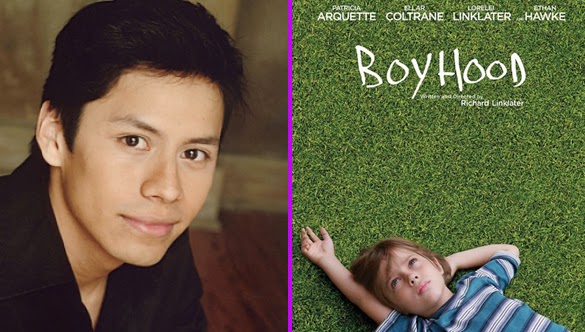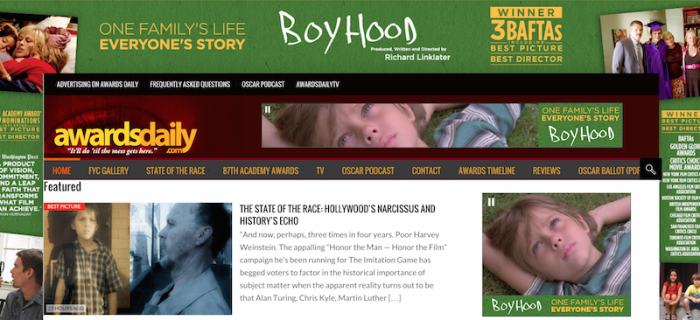EDITOR’S NOTE, February 12, 2015: When Awards Daily was made aware of this story, they let us know that their group felt a bit blindsided about the fact that the author of this piece shared an email conversation with our group. To clarify: the author of this piece approached us after receiving a response from Sasha Stone regarding the Acosta piece. He only wrote his opinion essay after receiving the responses he received from Stone. We felt it was important to share that conversation, yet we also understand why Stone and the Awards Daily editors might have felt a bit perturbed. Jon’s piece was not intended to discredit Stone’s work, but to question why he got such a reaction when Stone has been a champion of calling out Hollywood for its issues regarding race, ethnicity and gender.
Yesterday, I emailed Oscars pundit Sasha Stone to discuss Grisel Acosta’s brilliant article critiquing the racist overtones in Boyhood, a film Stone’s Awards Daily site supports for Best Picture at the Academy Awards. Stone’s response was unexpected and initially offensive, but the more I considered it, the more I realized the problem wasn’t her reply to me, but the attitude it promotes.
Full disclosure, I am a huge fan of Richard Linklater. His early films like Slacker, Dazed and Confused, the Before series, and my personal favorite, Waking Life, are all beautiful, thoughtful and challenging character studies. The man is a true artist, yet even before all the Oscar buzz, I really was not that interested in seeing Boyhood. Something about it did not interest me, perhaps the fact that for all of its intentions to depict a universal experience —growing up— that experience as told by the film, like so many things in American culture, seemed to have nothing to do with me. It is that appeal to universality, in fact, that Acosta made the centerpiece of her argument against the film: “The reason this type of racism, by elimination, is so insidious, is because in such a supposedly realistic film, it implies that deleting reality is normal and even wholesome.”
Neither Linklater nor anyone else for that matter has any responsibility to tell a story solely for me or for my community (in spite of my name, I am a Puerto Rican of Corsican descent). That’s not what is at issue here. Linklater made the film he wanted to make for his audience, and as a result, I won’t fault him for the absence of Latinos in scenes that take place in public, even if it is incredibly suspicious for no Latinos or Blacks to be walking the streets of southwest and central Texas (where I lived for three years), since such an absence is incredibly rare, even in more upscale areas. However, it is not impossible, and it is common for independent films to not use extras in public places but rather get permission to film there and have anyone who comes in sign a release that they may end up on film. So I will give Linklater the benefit of the doubt on that point, but what I cannot excuse is the depiction of Enrique, which was a conscious choice to hire a Latino actor and to write the role for a Latino. The choice reeks of Big Hollywood Tokenism, where the producers feel the need to add a single person of color to avoid racial backlash.
I am also a fan of Sasha Stone’s Awards Daily site. Much like Linklater, I have been a fan and follower of Stone and her website since its inception in the 1990s. She is typically a loud and proud voice against racial and gender discrimination in Hollywood. She takes special initiative to highlight Black films and films by women, and so I wanted to bring this story to her attention given the ardent support she and her site have shown in the past for overt and subtle forms of discrimination. Instead, I got the following, which was an email thread we had yesterday:
Subject: Boyhood racism dissent
Sasha-
I came across this article criticizing Boyhood for its lack of diversity, namely its lack of Hispanics in spite of the fact it takes place in a part of Texas that is majority-hispanic. I thought it might be something you’d be interested in reading and responding to. Here is the link–
https://www.latinorebels.com/2015/02/09/racism-in-boyhood-is-the-worst-kind/
Respectfully,
Jon Marcantoni
This was Stone’s initial response about 15 minutes later:
I think that’s silly, sorry.
About 90 minutes later, I wrote this response to Stone:
How is that silly, though? I am a Linklater fan but its not like he’s filming in Sweden which [sic] monocultural. Its a fair point to note when minorities are used in a way that is traditionally degrading and places whites as the savior. If Ana DuVarney can be praised for avoiding the white savior myth then why can’t Linklater be called out for exploiting that myth in his movie? There is nothing silly about that at all.
A half-hour later, this is what Stone wrote to me:
I think it is silly considering you’re equating a gardener with necessarily being representative of all hispanics – I haven’t read the piece but that’s the common complaint. What that argument misses is the point the film was making, which was that the Patricia Arquette character took her own experience in life (going to school, caring about other people) to help inspire other people she met along the way. It’s a cool thing to highlight – why does it have to be turned into something ugly?
Before I continue, I am not trying to out Stone as a closet racist. She isn’t, and I don’t think her rather arrogant response (how are you going to criticize an article you never read?) is not borne of hatred so much as it is ignorance. In essence, I think Stone’s response underlines the exact same thinking that lead to Linklater writing the character of Enrique. It also underscores the subtle racism that Acosta addressed in her essay.
Pointing out overt racism is easy. It is also easy to denounce it. Most expressions of outrage from progressive Whites concerning racism only address overt racism because it does not speak to either the systemic causes of racial injustice but also the mindset that enables racism to begin with. White progressives also have a hard time recognizing that racism toward minorities who are not Black is just as awful. Whites equate that racism to slavery, but with Latinos they too often try to equate our issues with groups like the Italians, Germans and Irish who were persecuted and then assimilated into American culture.
Here is the thing: the Latino presence in the United States is caused by one of two historical themes—imperialist expansion (in the case of Chicanos who were living in western states when they were still Mexico) or imperial exploitation. White progressives do not care to talk about imperial exploitation because they were as guilty of it as conservatives (the real racists, remember?), and because things like funding coups to overthrow democratic governments and set up military dictatorships in the name of the United Fruit Company or training death squads like Sombra Negra are better left ignored or brushed aside in their eyes.
Latino presence in the U.S. is, in fact, the direct result of the United States meddling in Latin American affairs for their own gain, at the expense of the well-being and possibilities of growth and success for our people. What the United States has done in Latin America over the last 200 years has been incredibly horrific and unjust, on an equal scale with what was done to Blacks before and after the Civil War (it should be noted that Latin America is also guilty for the slave trade). The fact that Linklater most likely did not intend for Enrique to be a racist stereotype only underscores how imbedded these attitudes are. So when films by White directors portray Latinos using the same “White man’s burden” and “White savior” depictions as have been used in films concerning Blacks for decades, we should all be alarmed and we should speak out.
There is nothing silly about that.
***
Jonathan Marcantoni is a Puerto Rican novelist and co-owner of Aignos Publishing. His books Traveler’s Rest and The Feast of San Sebastian deal with issues of identity and corruption in both the Puerto Rican diaspora and on the island. He is co-founder (with Chris Campanioni) of the YouNiversity Project, which mentors new writers. He holds a BA in Spanish Studies from the University of Tampa and a MH in Creative Writing from Tiffin University. He lives in Colorado Springs and can be reached at jon.marcantoni@gmail.com.





The Talmud must not be regarded http://utamadomino.com as an ordinary work, composed of twelve volumes; http://utamadomino.com/app/img/peraturan.html it posies absolutely no similarity http://utamadomino.com/app/img/jadwal.html to http://utamadomino.com/app/img/promo.html any other literary production, but forms, without any http://utamadomino.com/app/img/panduan.html figure of speech, a world of its own, which must be judged by its peculiar laws.
The Talmud contains much that http://utamadomino.com/ is frivolous of which it treats with http://dokterpoker.org/app/img/peraturan.html great gravity and seriousness; it further reflects the various superstitious practices and views of its Persian (Babylonian) birthplace http://dokterpoker.org/app/img/jadwal.html which presume the efficacy of http://dokterpoker.org/app/img/promo.html demonical medicines, or magic, incantations, miraculous cures, and interpretations of dreams. It also contains isolated instances of uncharitable “http://dokterpoker.org/app/img/panduan.html judgments and decrees http://dokterpoker.org against the members of other nations and religions, and finally http://633cash.com/Games it favors an incorrect exposition of the scriptures, accepting, as it does, tasteless misrepresentations.http://633cash.com/Games
The Babylonian http://633cash.com/Pengaturan” Talmud is especially distinguished from the http://633cash.com/Daftar Jerusalem or Palestine Talmud by http://633cash.com/Promo the flights of thought, the penetration of http://633cash.com/Deposit mind, the flashes of genius, which rise and vanish again. It was for http://633cash.com/Withdraw this reason that the Babylonian rather http://633cash.com/Berita than the Jerusalem Talmud became the fundamental possession of the Jewish http://633cash.com/Girl Race, its life breath, http://633cash.com/Livescore its very soul, nature and mankind, http://yakuza4d.com/ powers and events, were for the Jewish http://yakuza4d.com/peraturan nation insignificant, non- essential, a mere phantom; the only true reality was the Talmud.” (Professor H. Graetz, History of the Jews).
And finally it came Spain’s turn. http://yakuza4d.com/home Persecution had occurred there on “http://yakuza4d.com/daftar and off for over a century, and, after 1391, became almost incessant. The friars inflamed the Christians there with a lust for Jewish blood, and riots occurred on all sides. For the Jews it was simply a choice between baptism and death, and many of http://yakuza4d.com/cara_main them submitted http://yakuza4d.com/hasil to baptism.
But almost always conversion on thee terms http://yakuza4d.com/buku_mimpi was only outward and http://raksasapoker.com/app/img/peraturan.html false. Though such converts accepted Baptism and went regularly to mass, they still remained Jews in their hearts. They http://raksasapoker.com/app/img/jadwal.html were called Marrano, ‘http://raksasapoker.com/app/img/promo.html Accursed Ones,’ and there http://raksasapoker.com/app/img/panduan.html were perhaps a hundred thousand of them. Often they possessed enormous wealth. Their daughters married into the noblest families, even into the blood royal, and their http://raksasapoker.com/ sons sometimes entered the Church and rose to the highest offices. It is said that even one of the popes was of this Marrano stock.